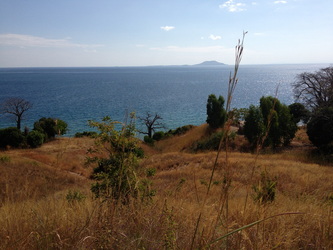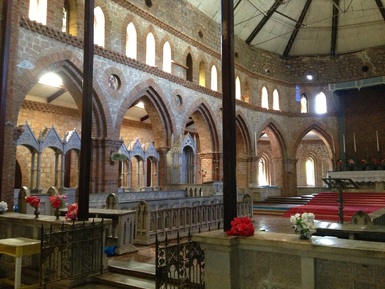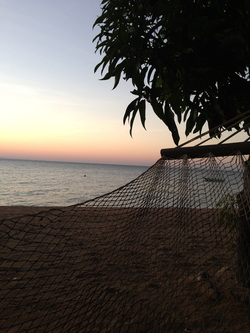 View of Chizimulu Island from the top of Mt. Njakwe
View of Chizimulu Island from the top of Mt. Njakwe UPDATE: I am back at the lodge again, though I am not sure for how many days. The power is in much better shape here; they discovered two wires that were shorting the system. It still needs new batteries, but we can actually charge our computers without taking them individually to the kitchen building, one at a time! I have also been able to load the missing pictures from the preceding post. Luxury!
JUNE 8: Today I hiked to the top of the mountain near Mango Drift, Mount Njakwe. It is an unmistakable landmark over in Mozambique because it is the place where the cell phone tower is located that serves the islands and the Mozambican lakeshore. Curiosity drove me to go up that mountain since I have been looking across the lake at it for a month whenever I have gone to Cobué. Needless to say, the view is unbelievable from the top – actually almost to the top, not the very top… the very top is a cell phone tower. As always when I am feeling a little proud of an accomplishment, two local residents – older women – are rapidly climbing the same path I just took. One is carrying a huge machete. In Chichewa they greet me and ask me where I have been (a standard greeting question). I tell them I had just climbed the mountain, and the woman with the machete tells me I am a “Man of Power.” We all have a good laugh over that, and they crossed over to the other side of the mountain.
JUNE 8: Today I hiked to the top of the mountain near Mango Drift, Mount Njakwe. It is an unmistakable landmark over in Mozambique because it is the place where the cell phone tower is located that serves the islands and the Mozambican lakeshore. Curiosity drove me to go up that mountain since I have been looking across the lake at it for a month whenever I have gone to Cobué. Needless to say, the view is unbelievable from the top – actually almost to the top, not the very top… the very top is a cell phone tower. As always when I am feeling a little proud of an accomplishment, two local residents – older women – are rapidly climbing the same path I just took. One is carrying a huge machete. In Chichewa they greet me and ask me where I have been (a standard greeting question). I tell them I had just climbed the mountain, and the woman with the machete tells me I am a “Man of Power.” We all have a good laugh over that, and they crossed over to the other side of the mountain.
 My favorite picture: the choir space (though the choir does not use it)
My favorite picture: the choir space (though the choir does not use it) JUNE 9: I went to the service at Saint Peter’s Cathedral this morning. I still marvel at how impressive the church is. I was anxious to get there by the 8 o’clock scheduled starting time and practically ran across the island; the service did in fact start at that time (!), so it was good that I made the effort.
Because it is a cathedral, this was a full service including communion. That meant the service was three hours and forty minutes long. The only difficult part was the announcement portion that replaced the prayers of the people. A man delivered a treasurer’s report that went on and on and on. Several young men in front of me looked at each other and simply got up and left. I stuck it through because I was determined to see the whole service. Everything was difficult to understand because they were speaking very fast and using amplification. Likoma has electricity every day from about 6 a.m. to noon, then again from about 2 p.m. to 10 p.m. In this part of the world, if a little amplification is good, maximum amplification must be just this side of godliness. Add to this that we are in a resonant space, and I leave the volume level to your imagination.
The choir was good, although I do believe there are some I have seen in Mozambique who are at least their equals if not better. The Mothers, however, are quite good. The Mothers Society is a group of women in many churches here. They usually wear outfits that almost look like habits: white blouses or jackets with dark blue skirts and often a white headscarf. They have many roles, not least of which include serving as a second choir and as child disciplinarians. They performed with considerable energy and very good tuning, not going sharp as they sang as tends to happen with most choirs here. They sang during offering and communion; I would have enjoyed hearing them do more.
The cathedral was full; I estimate it can hold a congregation between 350 and 400 people. After communion, though, all the young children who had been in Sunday School came up to the communion rail to be blessed, twenty or so at a time. Next came mothers with small infants. I believe there were a hundred children or more, so that would be approximately five hundred worshippers at the service, not counting infants being held by mothers. The island has eight thousand inhabitants total. The choir finished with a postlude song that I recognized from my time in Chigoma village. There is a fairly standard repertoire of songs that choirs perform, and I have now been here long enough that I am starting to recognize a few of the most popular. I hummed along with them as I left the church.
Because it is a cathedral, this was a full service including communion. That meant the service was three hours and forty minutes long. The only difficult part was the announcement portion that replaced the prayers of the people. A man delivered a treasurer’s report that went on and on and on. Several young men in front of me looked at each other and simply got up and left. I stuck it through because I was determined to see the whole service. Everything was difficult to understand because they were speaking very fast and using amplification. Likoma has electricity every day from about 6 a.m. to noon, then again from about 2 p.m. to 10 p.m. In this part of the world, if a little amplification is good, maximum amplification must be just this side of godliness. Add to this that we are in a resonant space, and I leave the volume level to your imagination.
The choir was good, although I do believe there are some I have seen in Mozambique who are at least their equals if not better. The Mothers, however, are quite good. The Mothers Society is a group of women in many churches here. They usually wear outfits that almost look like habits: white blouses or jackets with dark blue skirts and often a white headscarf. They have many roles, not least of which include serving as a second choir and as child disciplinarians. They performed with considerable energy and very good tuning, not going sharp as they sang as tends to happen with most choirs here. They sang during offering and communion; I would have enjoyed hearing them do more.
The cathedral was full; I estimate it can hold a congregation between 350 and 400 people. After communion, though, all the young children who had been in Sunday School came up to the communion rail to be blessed, twenty or so at a time. Next came mothers with small infants. I believe there were a hundred children or more, so that would be approximately five hundred worshippers at the service, not counting infants being held by mothers. The island has eight thousand inhabitants total. The choir finished with a postlude song that I recognized from my time in Chigoma village. There is a fairly standard repertoire of songs that choirs perform, and I have now been here long enough that I am starting to recognize a few of the most popular. I hummed along with them as I left the church.
 Another beautiful sunset, Likoma Island
Another beautiful sunset, Likoma Island On the way back to Mango Drift I took the western path away from Mbamba Bay. It is a hillier path but more scenic. Two girls about nine years of age approached me. We exchanged names; this is extremely important in the culture here – one’s name is vitally linked to one’s identity. In fact, the question here is not “What is your name?” as if it were separate from one’s being, it is “Your name is Who?” which implies that the knowledge of one’s name shares something of the essence of the person. Their names, as it turns out, are Lina and Alice. Next, as is common here, they first asked me (or rather, demanded) in English “Picture.” Next “Money.” Last, “Balloon.” I don’t know where the balloon part has come from, but this seems to be a universal request from children of this region when they encounter white adults. Once they were convinced that I didn’t have a means to provide any of these things (not least of which was because I told them so in Chichewa), instead of leaving, they befriended me on the way and began quizzing me on what things were in Chichewa. They started with parts of the body, then moved to houses and people, and finally to trees and flowers, which was terrific because I learned some new words in each category and reviewed some words I forgot I had learned. By the time we reached their homes on the western side we were talking away like old friends about school and friends and who lived where. I always enjoy conversing with children because their language is simple, direct, and relatively slowly spoken. I was sad to see them go, as I walked the rest of the way alone along the coast.
This was my last day in Likoma. On the 10th I would return to Nkwichi, retracing the voyage I took four days earlier. I would spend one afternoon and night at Nkwichi, but on the 11th it would be time to go on the next voyage. As I mentioned earlier, this would be my first trip inland. The schedule calls for me to visit Mcondece, Matepwe and Magachi, all villages in the same long valley between mountain ranges; but rumor has it that Matepwe has been abandoned due to crop damage from elephants. I suppose we shall see. I wonder if I will see any elephants….
This was my last day in Likoma. On the 10th I would return to Nkwichi, retracing the voyage I took four days earlier. I would spend one afternoon and night at Nkwichi, but on the 11th it would be time to go on the next voyage. As I mentioned earlier, this would be my first trip inland. The schedule calls for me to visit Mcondece, Matepwe and Magachi, all villages in the same long valley between mountain ranges; but rumor has it that Matepwe has been abandoned due to crop damage from elephants. I suppose we shall see. I wonder if I will see any elephants….
 RSS Feed
RSS Feed